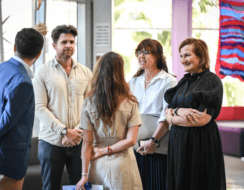14 May 2020
NewsFrom the CEO: Our country is stuck in a toxic relationship
With our political leaders and commentators pondering what Australia could look like as it gradually emerges from the COVID-19 shutdown, voices for many interests – political, business, community and labour – are jockeying for position in a heated debate on our immigration policy.
As someone from a migrant background who has spent decades supporting newcomers to our shores, I’m frankly tired of the predictable way we continually return to the same nationalistic, negative and – often – racist finger pointing during times of trouble.
This comes down to our own confused identity as a migrant nation, which began when the first settlers declared Australia ‘terra nullius’ – or legally uninhabited – in order to take possession. We’ve made progress in reconciling with Indigenous Australians since then but have yet to achieve makarrata: a Yolngu word that means coming together after a conflict.
With a tenuous claim to land built on foundations of dispossession, it is no wonder we have had such a complex relationship with subsequent waves of migrants. On one hand, we have welcomed migrants with open arms – think the Ten Pound Poms or those workers who built the Snowy Mountains Scheme.
That is how we’ve reached a point where one in two Australians identify as coming from a migrant background, and where we celebrate our multiculturalism with the annual Harmony Day.
But, in all those years since colonisation, we have never shaken the idea that migrants are an ‘other’ to be feared and distrusted. As we begin the slow economic recovery from this pandemic, we must ensure that COVID doesn’t inflame those fears.
I heartily agree with those who say our post-pandemic economic recovery must help all Australians get back on their feet. But it is incredibly unhelpful to conflate our migration intake with the issues at play in the millions of Australians who have found themselves out of employment as a result of this virus.
With Australia now slowly lifting isolation restrictions, it is paramount that we do have a conversation about how – and when – we re-open our borders. But that conversation needs to be led from communities – not top-down from people who have benefited from the economic perks of migration, without facing the barriers.
Already, terrorism studies experts are warning that elements of Australia’s far-right are using the coronavirus crisis to stoke resentment against migrants. Isolationists and protectionists are also jumping on the bandwagon, leading to rising racist attacks on people of Asian descent.
Some argue that fewer migrants means more job and housing opportunities for Australians but, as we head into an economic recession, we need the increased consumer spending that comes with population growth. Migrants contribute far more to the economy in taxes and social contributions than they receive in benefits, and they are considerably more entrepreneurial than your average citizen, so they actually create jobs.
Temporary migrants in particular are either highly skilled and doing jobs we don’t have the skills for in our country, or they are very low skilled and coming in to do the jobs we don’t want to do ourselves. It defies comprehension to point the finger at what is often a very vulnerable group in our society, who regularly experience exploitation.
This pandemic allows us the opportunity to re-set our public narrative on migration – to strike the right balance with permanent migration and have an educated conversation about the social and economic benefits of temporary migration and fairer pathways to permanency and citizenship.
While our politicians continue analysing when it will be safe to open our borders, it is incumbent on the rest of us to show we have evolved beyond our ancestors of the Middle Ages, who used the pandemic of their times – the Black Death – as an excuse to persecute women and ethnic minorities such as Jewish and Romani people.
Let’s not repeat history. Let’s not give time to those who stoke division. Let’s instead use our voices and actions to enhance social cohesion, and to ensure that when this pandemic is over, we’ve left the welcome mat at the door.
Violet Roumeliotis
SSI CEO


